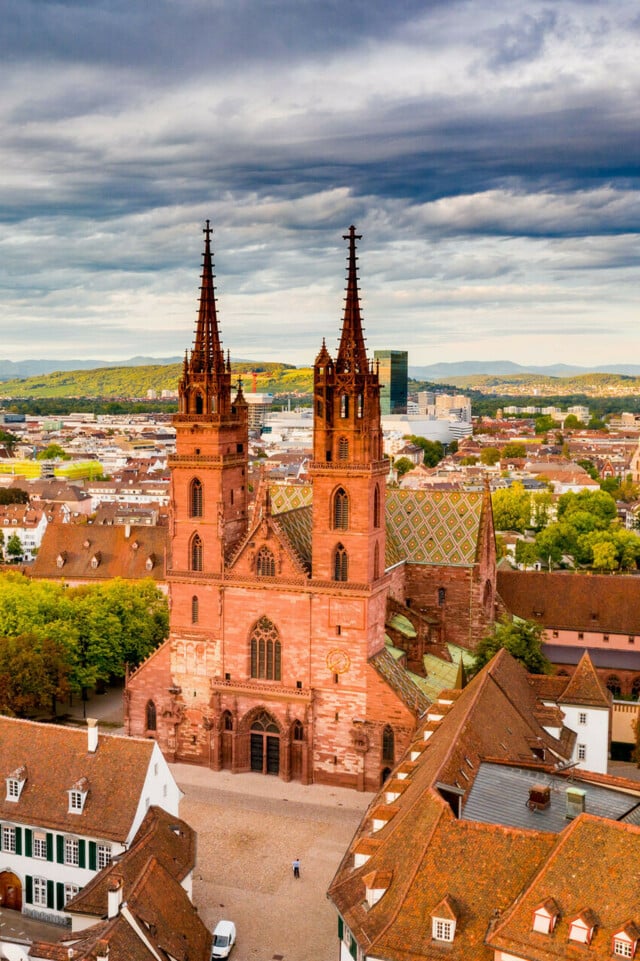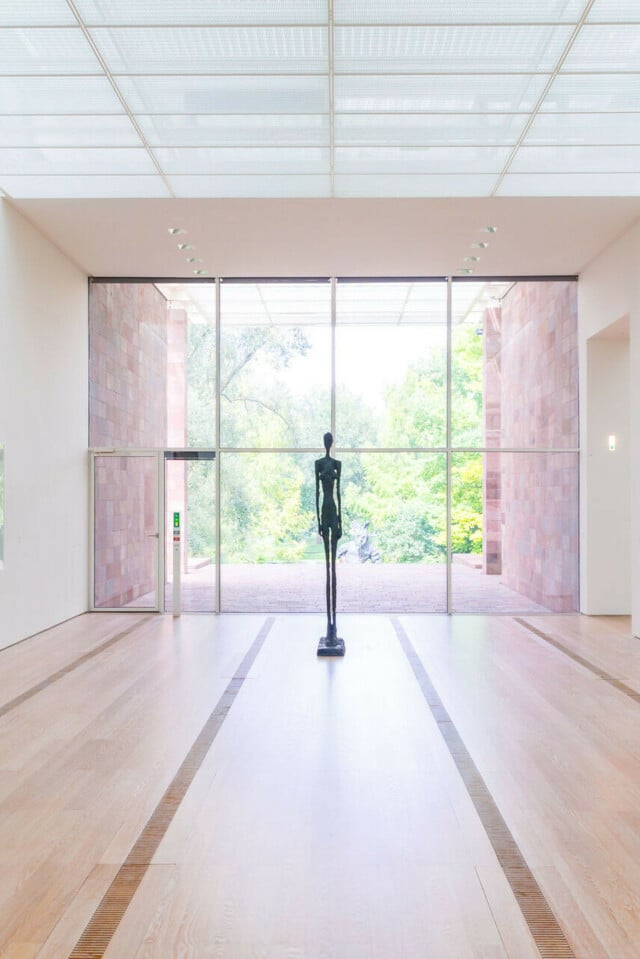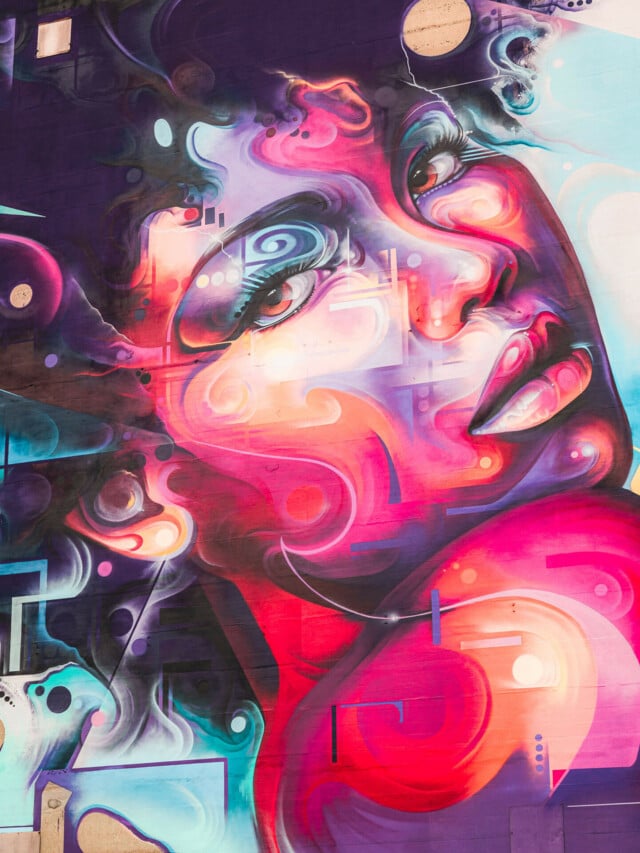Public art in Basel
16 works of art in Basel’s public spaces
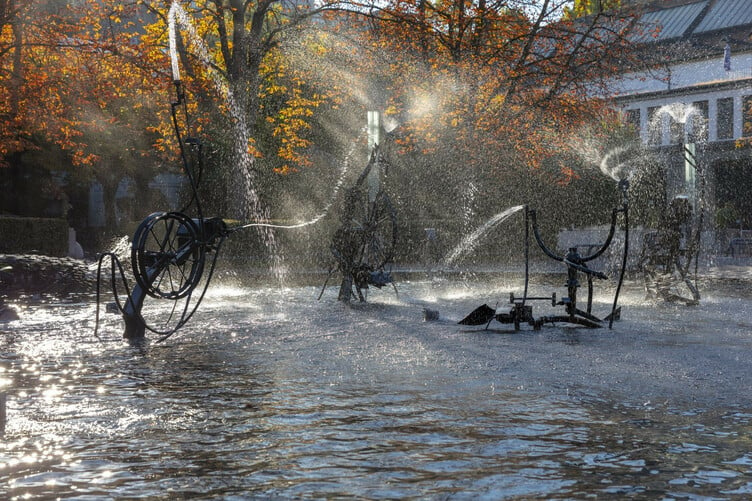
Jean Tinguely: Tinguely fountain
Begin your public-art tour at Theaterplatz, at what is probably one of the city’s most striking works of art in a public space: the Tinguely fountain – also known as the Fasnachts-Brunnen (Carnival Fountain) – by Jean Tinguely. Nine figures spouting water make for an amusing scene. And not without reason: this exact spot used to be home to the stage of the old city theatre. The Tinguely fountain, which was revealed in 1977, is a tribute to the actors and dancers who used to appear here. The figures in the fountain are made from parts of the theatre, which was demolished. The Tinguely fountain is particularly beautiful in winter, when impressive ice sculptures form over the figures.
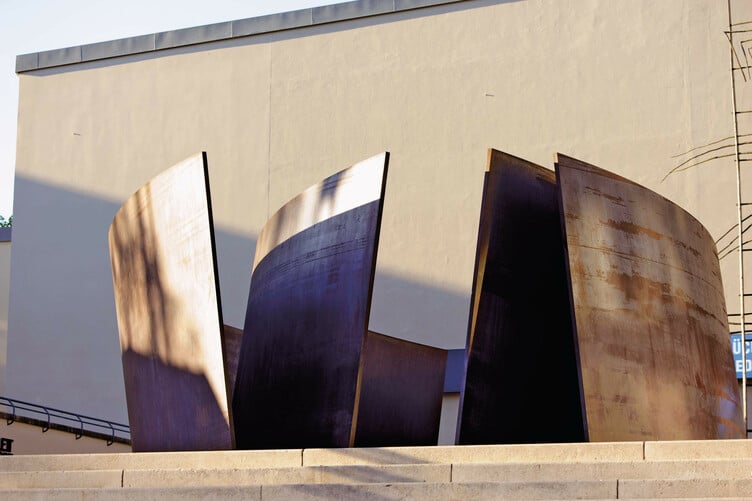
Richard Serra: Intersection
You will find the next work of art just a short walk away, right in front of the entrance to Theater Basel – Richard Serra’s Intersection. You can’t miss the huge sails made of steel. Planned as part of a temporary exhibition in 1992, the sculpture was subsequently privately gifted to the public.
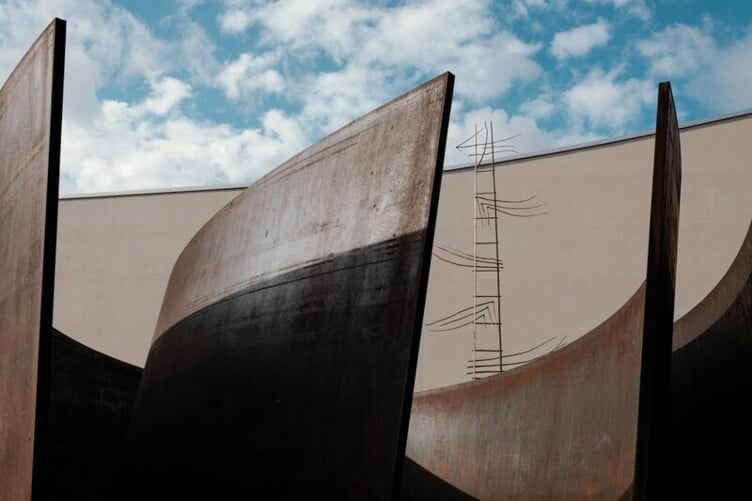
René Küng: Grosse Mondleiter
The next work of art is right behind this one: the Grosse Mondleiter by local artist René Küng. Curved rungs, most of which are made from tree branches, portray a stairway to heaven above the roof of the theatre. The sculpture, with its linear design, was established on Theaterplatz in 1980.
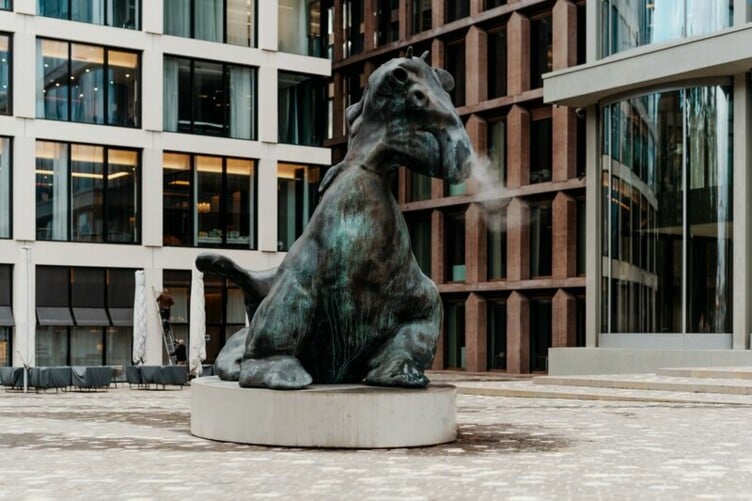
Thomas Schütte: Drittes Tier
Thomas Schütte’s 3.5 metre-tall bronze sculpture Drittes Tier has watched over the square in front of Baloise Park and Mövenpick Hotel Basel since 2020. This fantasy creature, composed of all kinds of animals, snorts steam like a dragon.
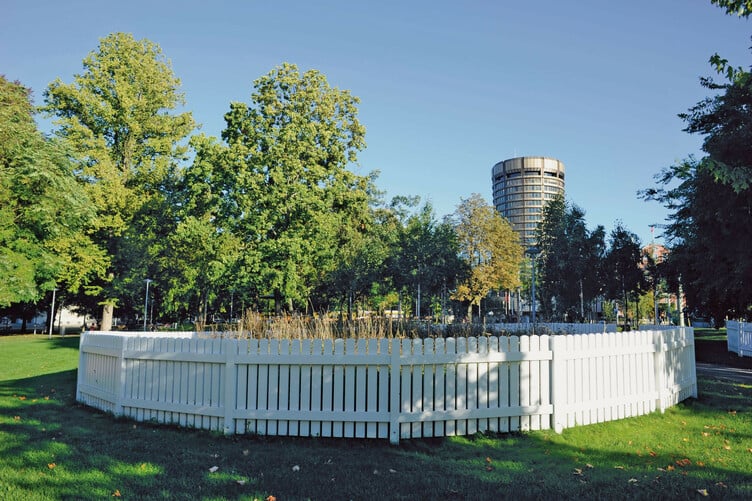
Erik Steinbrecher: Landler and Polka
The art tour continues in the De Wette park. Here, round white fences surround wild undergrowth and trees. It might not look like art at first glance, but the piece was created by Basel artist Erik Steinbrecher. Landler and Polka were created in 2008 as part of the redesign of the park.
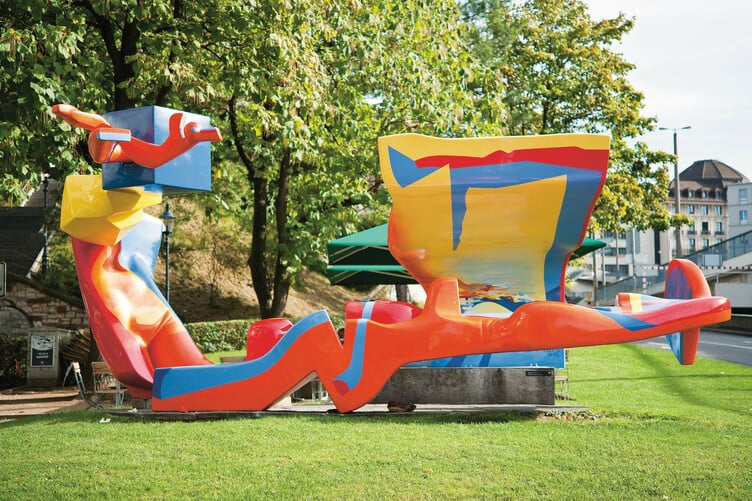
Michael Grossert: Lieu dit
Your journey then continues on to Heuwaage. You will quickly spot the bright sculpture Lieu dit by Basel artist Michael Grossert. It is a combination of painting and sculpture, tectonic and organic forms. In 1976, this was new and provocative for Basel. At the same time, though, the sculpture represented friendship between artists. When the piece was destroyed by vandals shortly after it had been revealed, friends painted the opulent object again from scratch.
As part of the all around Basel | art in public spaces project, artists share their enthusiasm for art outside the museum walls. One of the eight short films is dedicated to the sculpture Lieu dit.
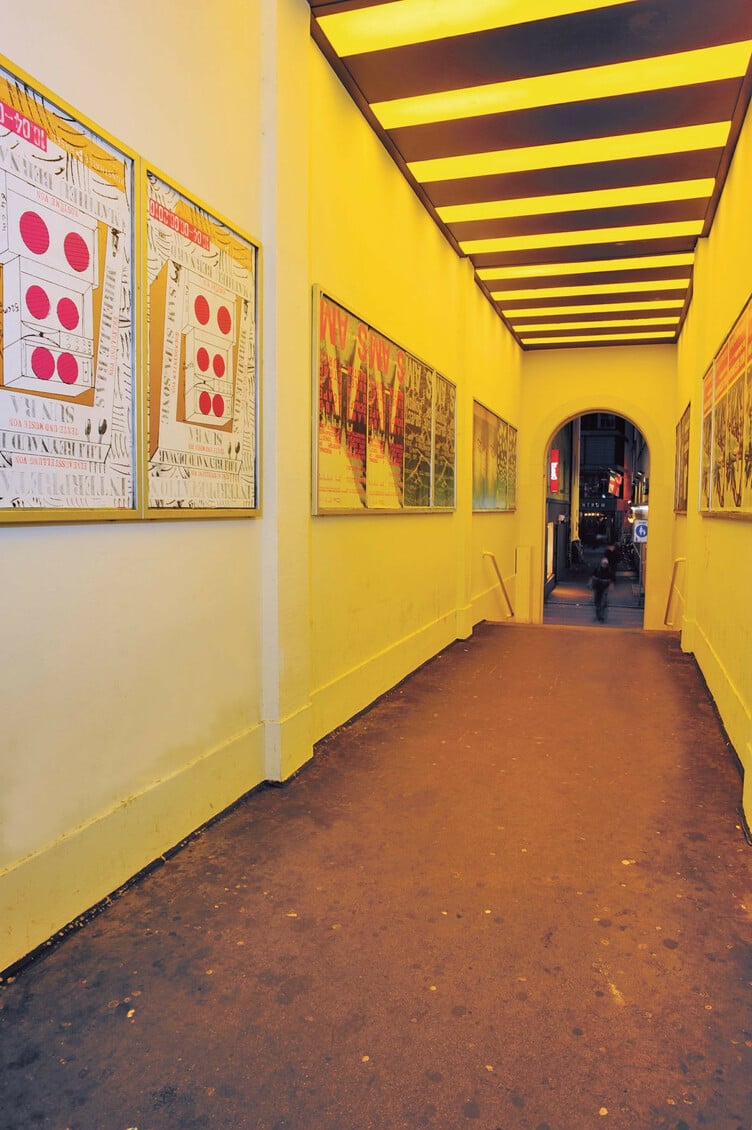
Marc Covo: Luege-Lose-Laufe
Head back to the theatre and turn left into Theatergässlein towards the Birsig car park. It looks as though you should be walking upside down on the ceiling here – because there is a pedestrian crossing up there. The piece Luege-Lose-Laufe by Marc Covo has brightened up the little passageway since 1993.
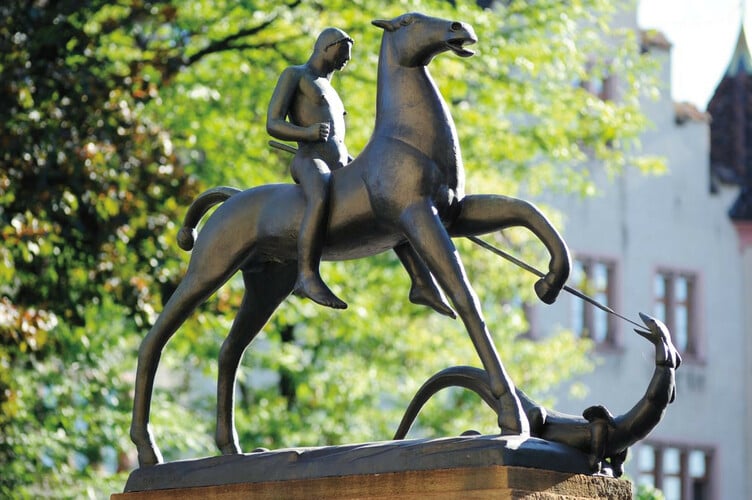
Carl Burckhardt: Ritter Georg
Head along Steinenvorstadt to Barfüsserplatz and take the steps up to Gymnasium Leonhard. At the top of the steps to Kohlenberg, a naked Ritter Georg sits on his horse atop a high pedestal. This elegant bronze statue by Carl Burckhardt was created in 1922 and stands out from afar thanks to its S-shaped silhouette.
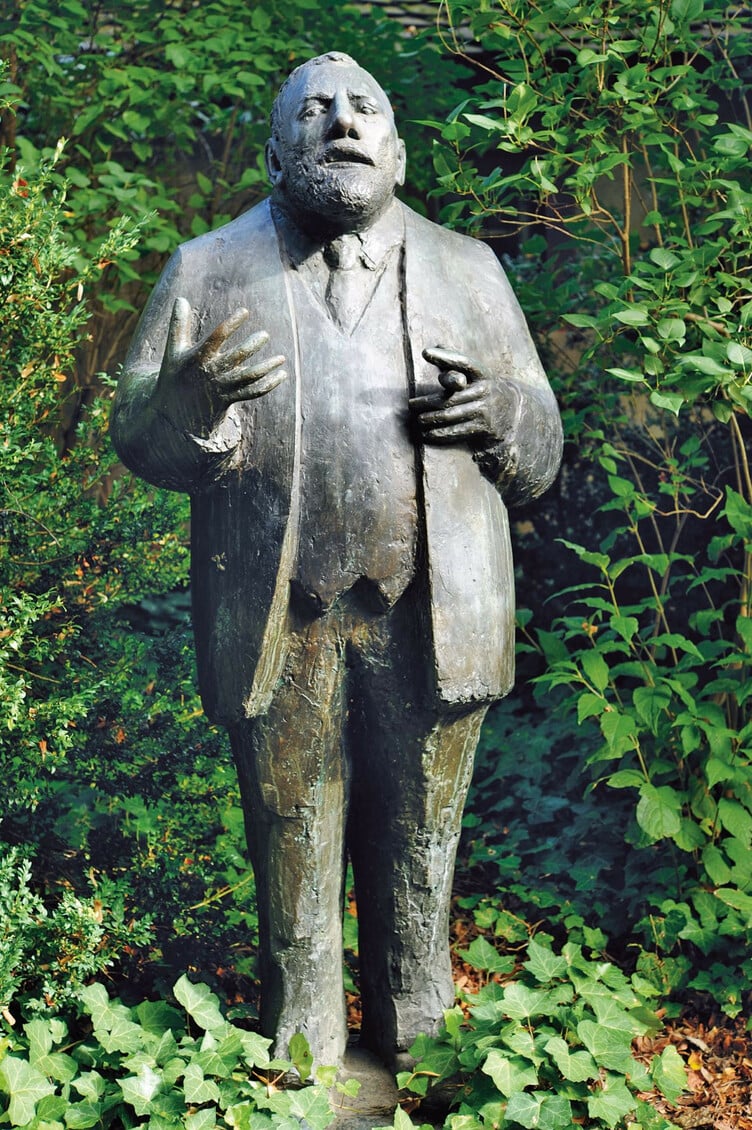
Peter Moilliet: Dr Rudolf Riggenbach
From here, it’s just a short walk to Leonhardskirchplatz. Sculptor Peter Moilliet has placed his own monument to Basel’s curator of monuments and art connoisseur Dr Rudolf Riggenbach here. With an open coat and a smoking cigar, the sculpture of the man himself draws a lot of attention.
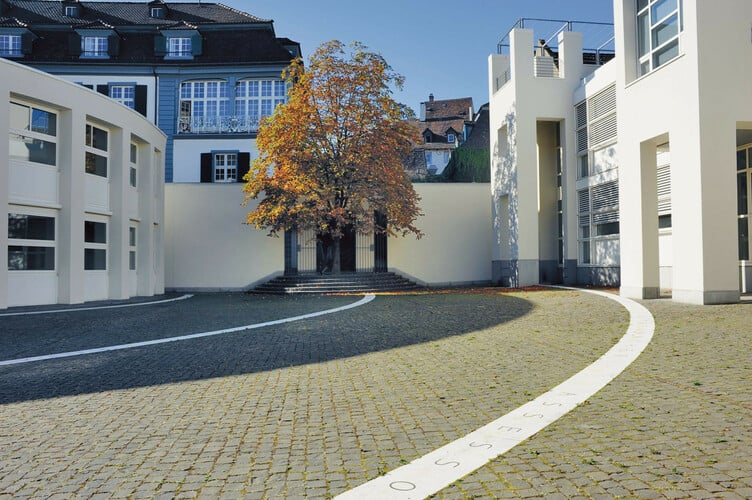
Hannes Vogel: Arion, Omar, Schwarzer Teufel, Silberpfeil
Arion, Omar, Schwarzer Teufel, Silberpfeil – these catchy names once belonged to horses in literature from around the world. They are embedded in the floor of nearby Rosshof, to remind visitors of a bygone age. This piece of art is by artist Hannes Vogel.
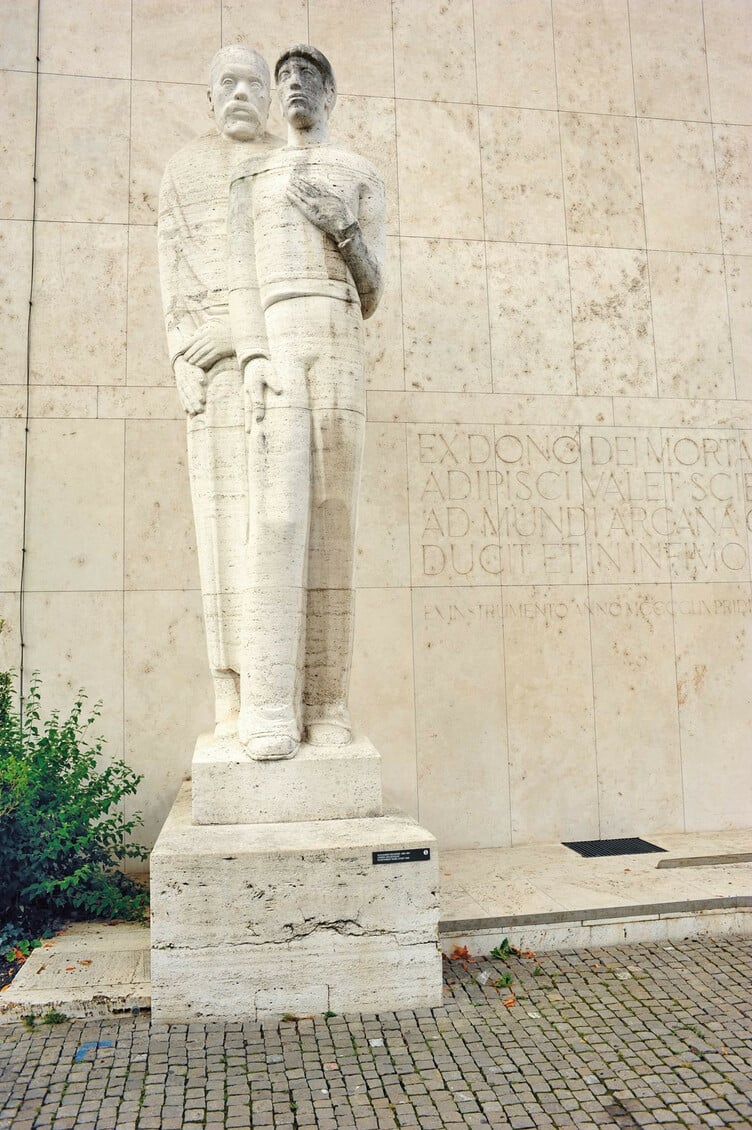
Alexander Zschokke: Lehrer und Schüler
Next to the collegiate house of the University of Basel at Petersplatz, you will find the sculpture Lehrer und Schüler by Basel sculptor and artist Alexander Zschokke. It is reminiscent of the classical antiquity and religious sculptures of the Middle Ages. The larger-than-life figure conveys discipline, knowledge and honour – values that the oldest university in Switzerland (founded in 1460) still embodies to this day.
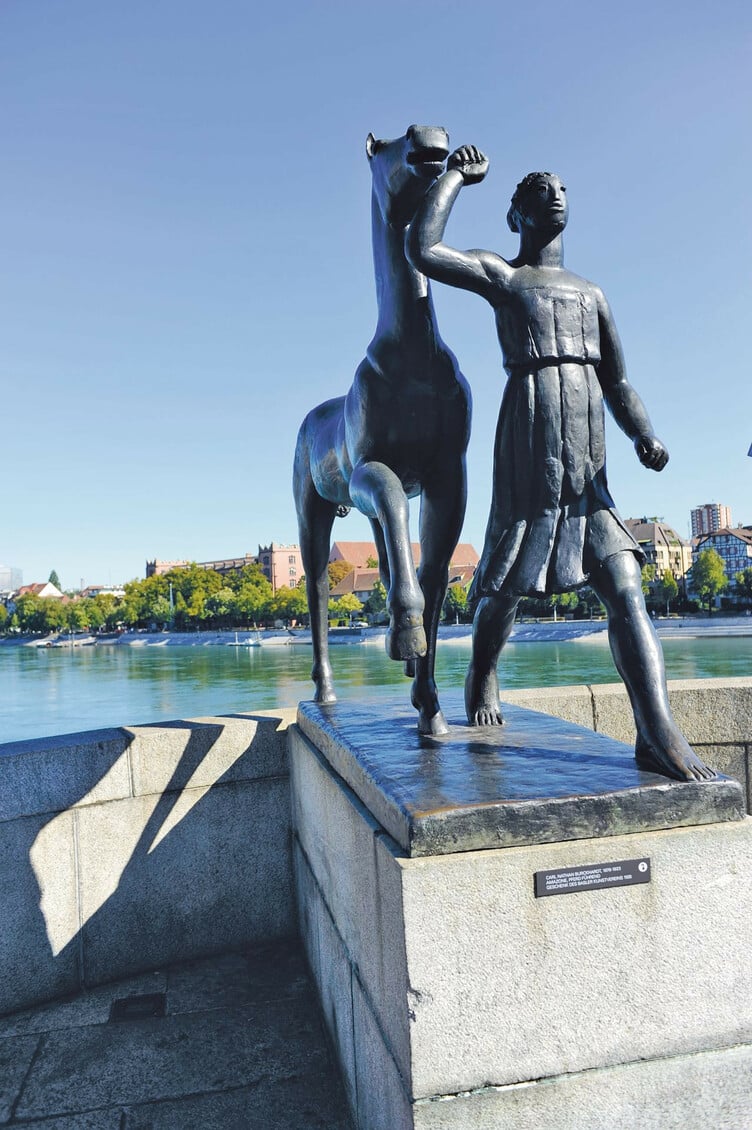
Carl Burckhardt: Amazone, Pferd führend
At Schifflände, to the left of the Mittleren Brücke, stands another sculpture by Basel sculptor Carl Burckhardt, called Amazone, Pferd führend. This was his last piece before his death. If you look closely, you will see traces of work from the plaster model, which was only cast in bronze three years after Burckhardt’s death (1926).
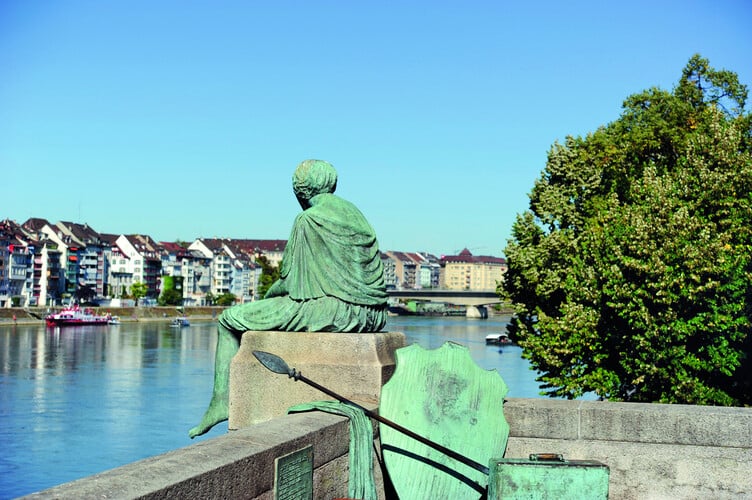
Bettina Eichin: Helvetia auf Reisen
At the other end of the Mittleren Brücke, Helvetia auf Reisen by Bettina Eichin sits atop a wall on the Kleinbasel side of the Rhine. She has set her suitcase and shield down next to her and is gazing into the distance, lost in thought.
One of the short films in the cultural project all around Basel | art in public spaces is dedicated to the work Helvetia auf Reisen.
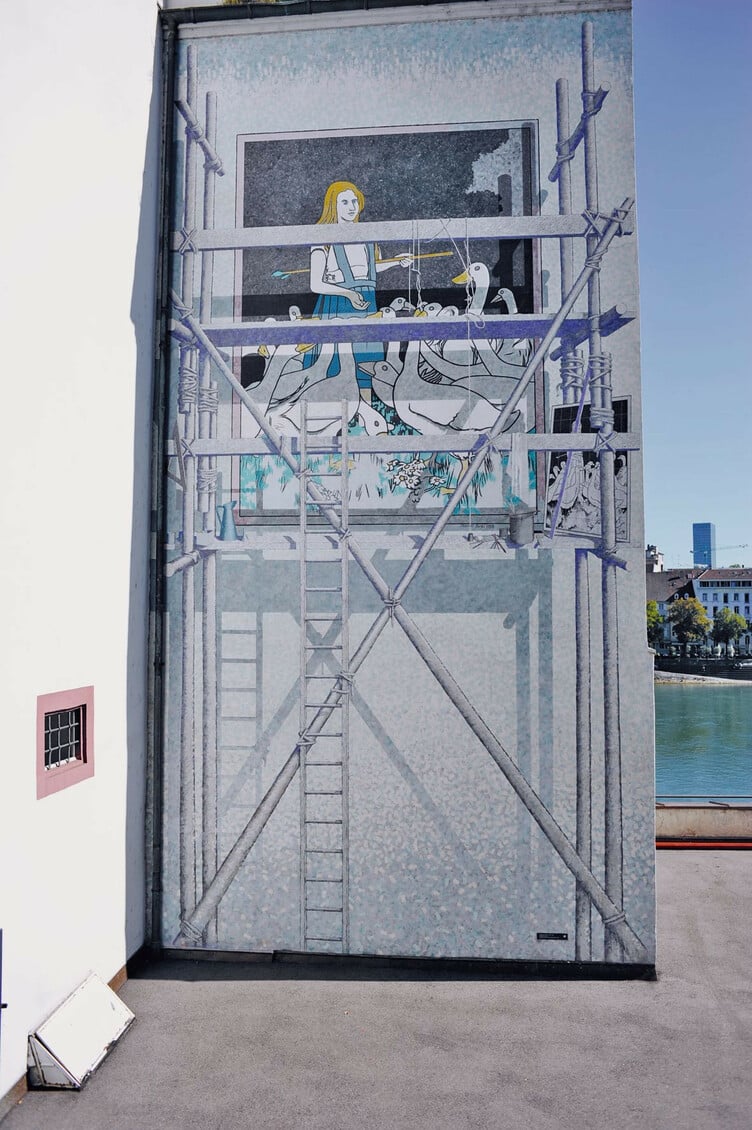
Samuel Buri: Gänseliesel
If you now take the Rheinsprung back to Grossbasel, you will find another work of art by an artist from Basel on a wall on the left-hand side: Gänseliesel by Samuel Buri looks somewhat unfinished. The mural looks like a black-and-white image, with the artist’s utensils on a set of scaffolding. It’s the perfect optical illusion.
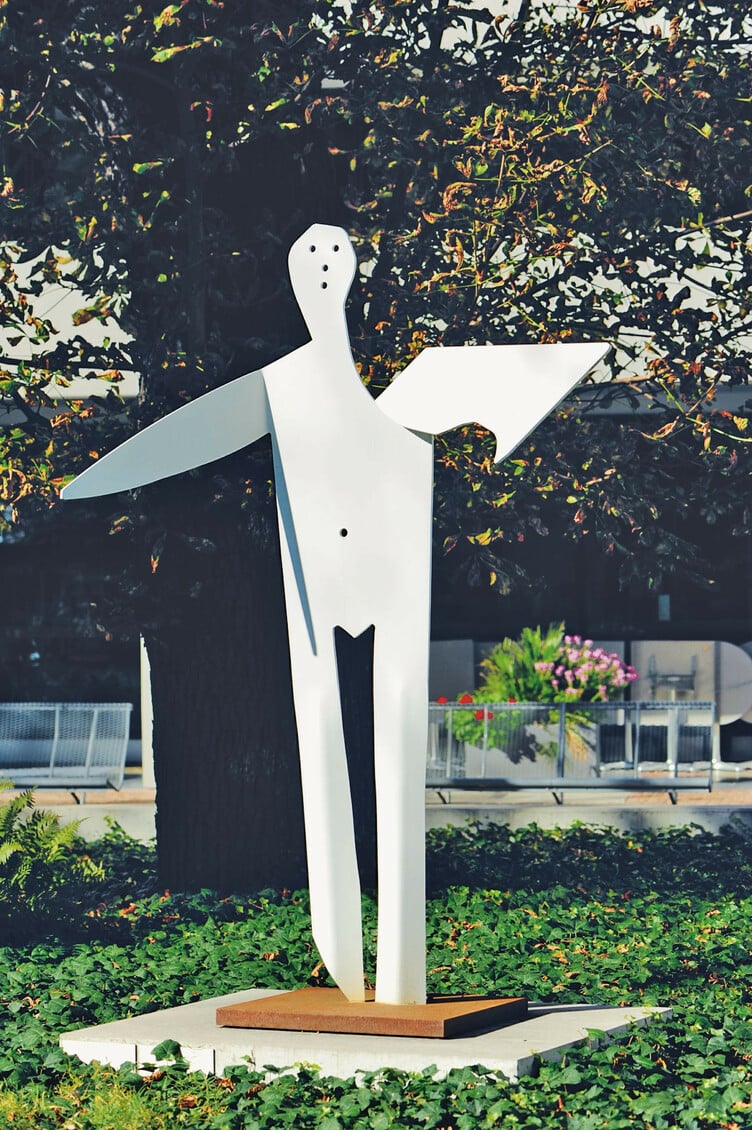
Pablo Picasso: L’homme aux bras écartés
Now walk up the Rheinsprung to the Picassoplatz, where you will find the sculpture L’homme aux bras écartés – a weatherproof version of the original work by Pablo Picasso.
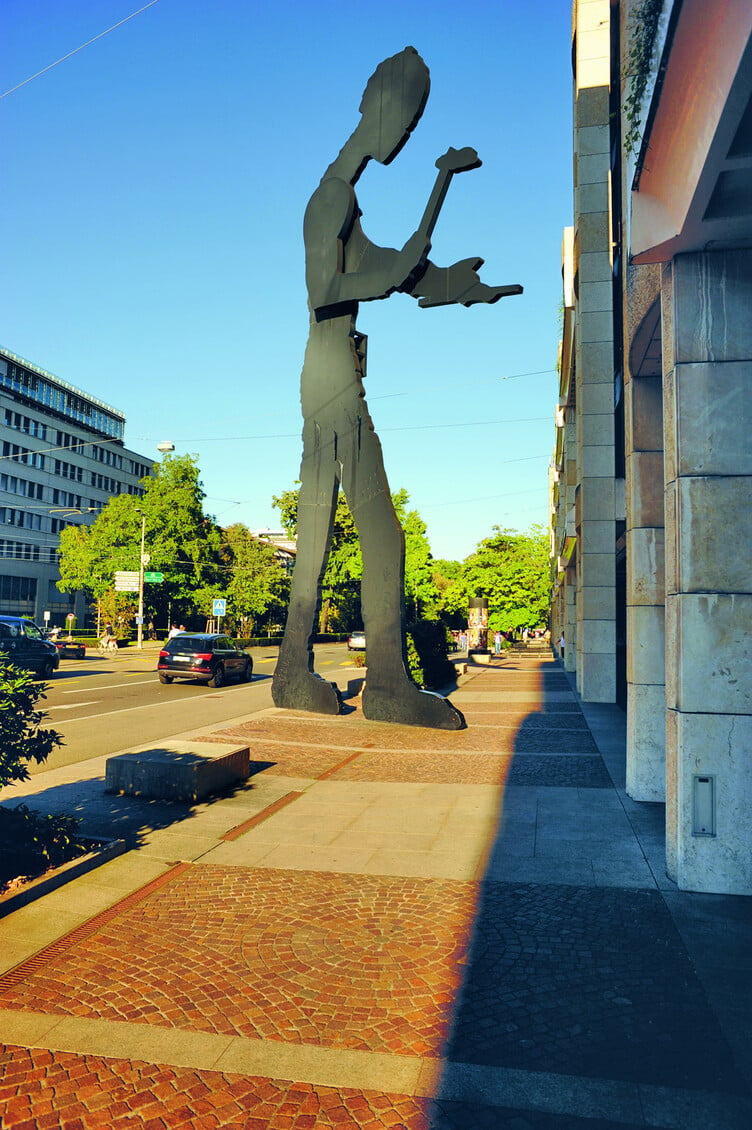
Jonathan Borofsky: Hammering Man
If you now head towards Aeschenplatz, you will already be able to see what is probably the largest and most obvious piece of public art in the city. The Hammering Man by Jonathan Borofsky is the final stop on our art tour. The figure carries out its work here in an endless loop: the gigantic, black sculpture, made from aluminium and steel, slowly strikes its hammer three to four times a minute.



